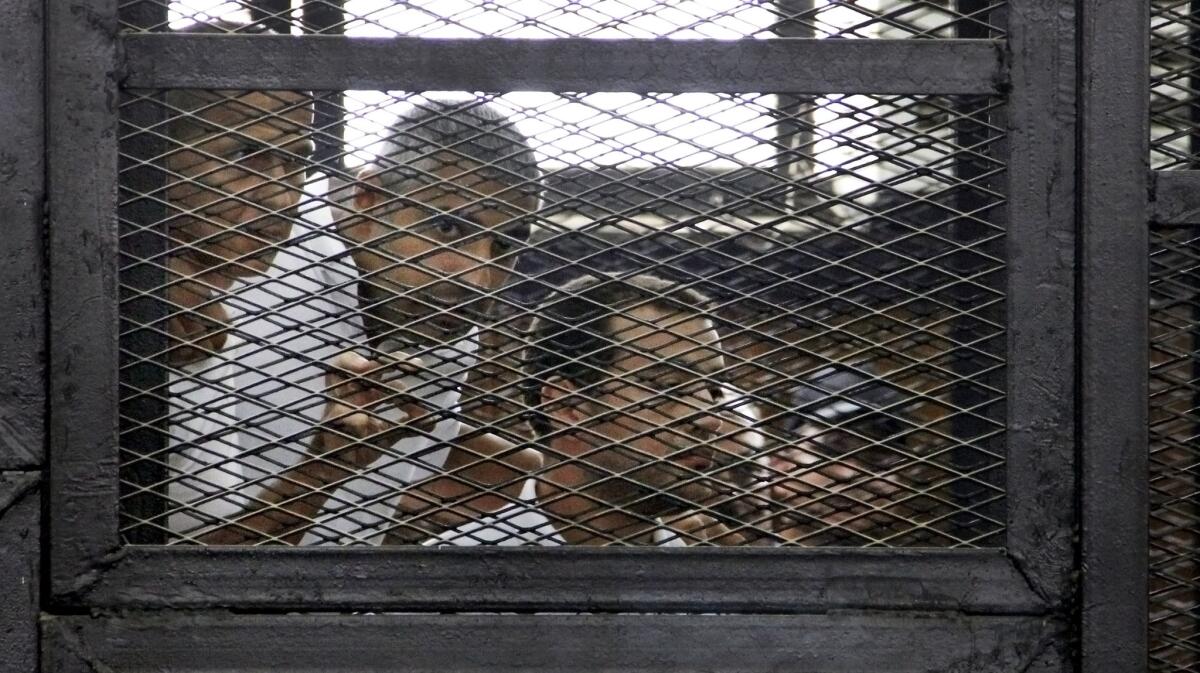Editorial: U.S. needs to press Egypt -- on freedom of the press and other rights

- Share via
On Sunday, after a meeting in Cairo with Egyptian President Abdel Fattah Sisi, Secretary of State John F. Kerry suggested that Sisi should be given time to respond to U.S. complaints about human rights violations. After all, Kerry noted, Sisi had been in office for “only 10 days.” (Never mind that Sisi, a former general who overthrew Egypt’s previous president in a coup last year, was the de facto leader of the country even before he was elected president in May.)
Kerry had to change his tune abruptly on Monday after an Egyptian judge sentenced three journalists from the Al Jazeera news service to lengthy prison terms on trumped-up terrorism-related charges. Rightly calling the sentences for the journalists and other defendants “chilling” and “draconian,” Kerry urged the Egyptian government to “review all of the political sentences and verdicts pronounced during the last few years and consider all available remedies, including pardons.”
That message would have more force if the U.S. would make expeditious pardons for the journalists — and clemency for other victims of politically motivated prosecutions — a precondition for the full resumption of military aid to Egypt. More than $500 million in assistance that had been suspended was recently released, but an additional $70 million is being held.
Unfortunately, both the administration and many in Congress have been far too wiling to give Egypt the benefit of the doubt, attaching more importance to strategic issues — including Egypt’s continued observance of a peace treaty with Israel — than to human rights or political legitimacy.
When the military led by Sisi overthrew Islamist President Mohamed Morsi last summer, the administration studiously refrained from describing that action as a military coup, lest it trigger a legal requirement for an automatic suspension of aid. At one point, Kerry fatuously suggested that the armed forces were “restoring democracy” by deposing a popularly elected president.
To be fair, the administration did suspend some aid in response to the military-backed government’s crackdown on dissidents. It also urged the government to treat Morsi and his Muslim Brotherhood magnanimously and to pursue what President Obama called “a more democratic path.” But the world’s leading democracies don’t just hold elections; they also guarantee freedom of the press, the right to organize political opposition and due process of law. All of those values have been subverted in the aftermath of Morsi’s overthrow.
Egyptian officials insist that the country’s judicial system is independent. But, as a State Department official noted the other day, the judiciary “in many ways is clearly responding to a political environment that the government has created.” The U.S. should press Sisi to send a different message to the courts and to his countrymen — beginning with clemency for Al Jazeera’s journalists.
More to Read
A cure for the common opinion
Get thought-provoking perspectives with our weekly newsletter.
You may occasionally receive promotional content from the Los Angeles Times.









